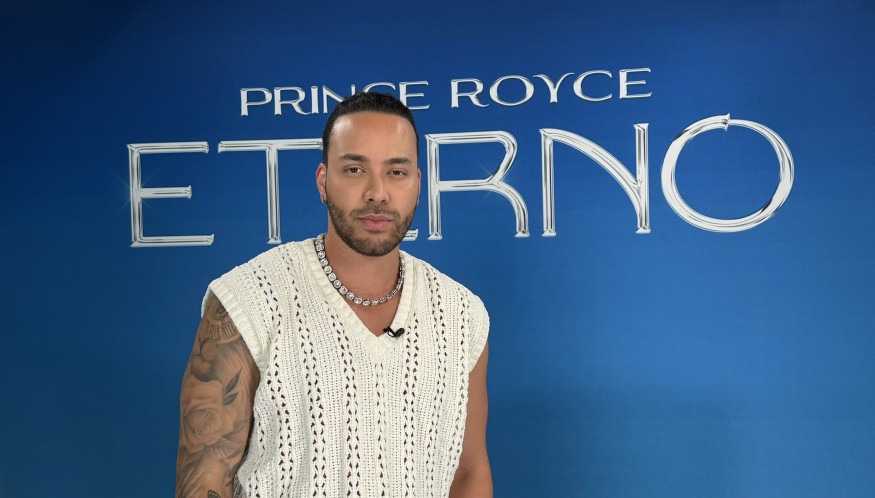Prince Royce Explains Why The Beatles, Luther Vandross and the Backstreet Boys Belong in Bachata Too - INTERVIEW
The Latino singer-songwriter embraced the concept of his first hit for his new album, "Eterno"

Latino singer-songwriter Prince Royce grew up in the Bronx, where the rhythms of bachata came through the speakers at family gatherings, but the melodies of his childhood were often sung in English. Bee Gees, Lionel Richie, The Beatles, Luther Vandross. They weren't just songs. They were emotional anchors.
Now, with "Eterno," his eighth studio album, Royce has done something few Latin artists have dared to try at this scale: he's reimagined thirteen iconic Anglo pop songs from the 70s, 80s, and 90s, not just as translations, but as bachatas with heart, soul, and swing.
"This wasn't about nostalgia for the sake of nostalgia," Royce tells The Latin Times and ENSTARZ ¡Latino!. "It was about the music that shaped me. I wanted to bring those melodies into my world."
His world, of course, is one built on rhythm and romance. Since debuting in 2010 with a Spanglish bachata version of 'Stand by Me,' Royce has pushed genre boundaries while staying rooted in Dominican sounds. Now, with "Eterno," he returns to the concept that launched his career, but with far more vision, maturity, and intention.
"I had doubts," he admits. "You never know how people are going to react. These are sacred songs. People might say: 'Why would you touch that classic?' But I started getting great feedback early—people saying, 'Wow, I never imagined this in bachata, but it works.'"
Indeed it does. "Eterno" finds new grooves in 'My Girl' by The Temptations, adds syncopation to 'Dancing in the Moonlight' by King Harvest, and gives 'How Deep Is Your Love' a breathy, romantic lilt that makes it feel both timeless and brand new.
But this isn't just a genre experiment—it's also deeply personal. One of the most moving tracks on the album is 'How Deep Is Your Love,' a song Royce associates with his mother's early days in the U.S.
"She used to work in a factory when she got here. That song played all the time. For her, it meant something big—something beautiful. So I thought, let me honor that memory," he says.
The process of making "Eterno" started not in a studio, but in Royce's own playlists. "I went back and listened to music from the 70s, 80s, 90s—the stuff I grew up hearing at home, on the radio, in movies. But I didn't want to force anything. If it didn't feel natural in bachata, I let it go."
Every track had to meet a simple but high standard: does this feel like it was always meant to be bachata?
To ensure that standard, Royce worked with longtime producer D'Lesly Lora. "We kept the original chord changes for most of the songs," Royce explains. "We wanted to respect the DNA of the music. But then we brought in the tambora, the guitar, the rhythm—and suddenly it was like the song took on a new life."
Take 'Yesterday' by The Beatles—a song Royce nearly recorded 15 years ago. "It was between 'Yesterday' and 'Stand by Me' when I was just starting out. I went with 'Stand by Me', but 'Yesterday' never left me," he recalls. "Recently, I saw a live version Juan Luis Guerra did—kind of bachata-flavored—and it pushed me to finally do it."
Still, turning classics into something new came with complications. "It took about eight months to clear all the rights," he says. "You have to go through every publisher, every songwriter. And I didn't want to change a single lyric without approval."
The payoff is an album that feels seamless: not a tribute project, not a cover album, but a cultural bridge—a reinterpretation of pop canon through a Latin Caribbean lens.
Even the album title, "Eterno, speaks to the ambition behind it. "I've always believed music can be eternal," Royce says. "There's a difference between infinity and eternity. Infinity has a start that never ends. But eternity? It's always been. It just floats. It just is."
That philosophy isn't just abstract for Royce—it's a guide. "One day I won't sing the same way. One day I'll be older. But what I record stays. That version lasts forever. That's why I take it so seriously every time I step into the booth."
He also reflects on the shifting nature of ownership in music. "Back then, you had CDs, cassettes, and vinyl. Now everything's a file. A license. You don't really own the thing you love," he says. "I still have my CDs, my vinyl collection. I have "Thriller" on clear vinyl. I still play them. They feel real."
In a strange coincidence, Royce was in Spain during a massive blackout while visiting Sony offices. "It took me four hours to get to the hotel," he says, laughing. "No phone service, no lights. It reminded me: you need batteries, water, canned food... and music. Add "Eterno" to your hurricane kit!"
What started as a bold experiment has become one of Prince Royce's most emotionally resonant works. It's not just about giving new life to beloved songs. It's about giving them a second home—one where Latin listeners hear their own rhythm in the songs they already know by heart.
"There's this idea that music connects to memory," Royce says. "But sometimes, all you have is the emotion. And emotion is enough."
WATCH the whole interview here
Originally published on Latin Times
Subscribe to Latin Post!
Sign up for our free newsletter for the Latest coverage!
© 2025 Latin Times. All rights reserved. Do not reproduce without permission.















